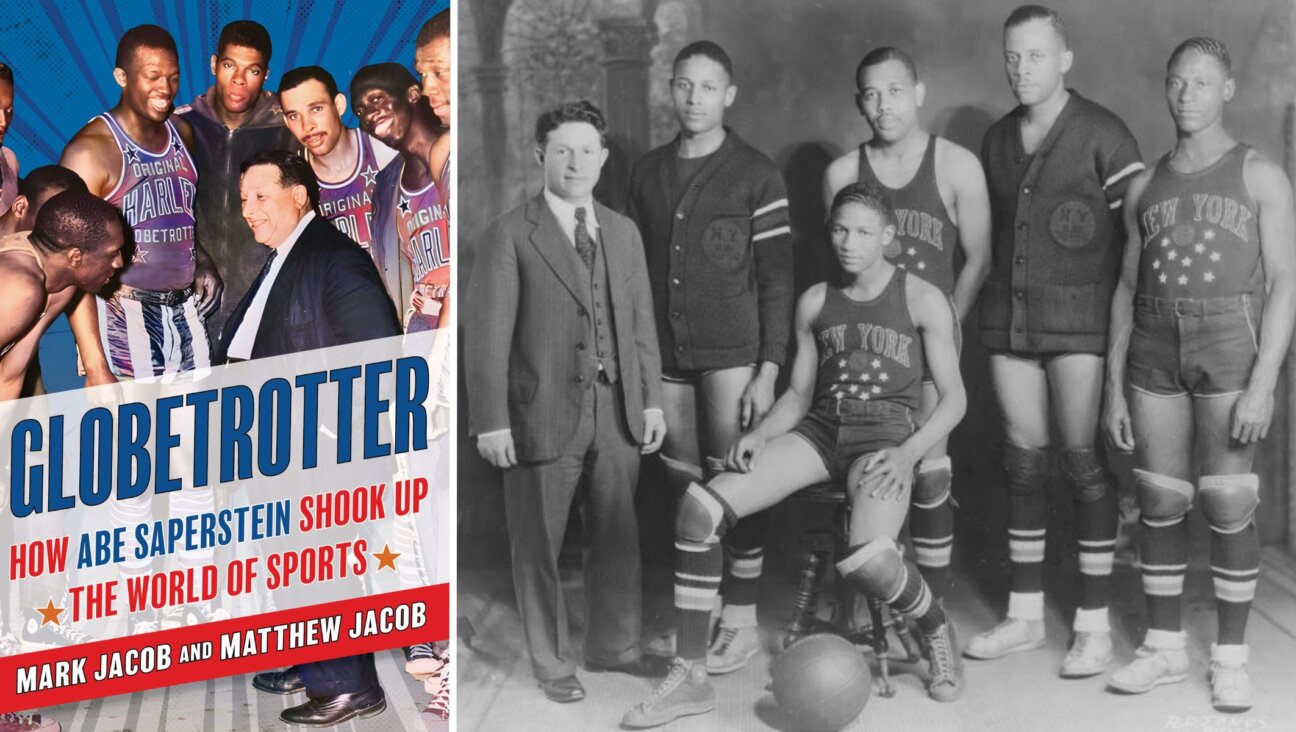Meet the Orthodox therapist who says watching ‘Bridgerton’ could improve your sex life

If you visit Dr. Bat Sheva Marcus’s Instagram, which you absolutely should, you will find many informative videos.
Videos about the challenges of having sex while breastfeeding. Videos explaining the various causes of pain during intercourse. Videos about the items you should include in your “sex basket.” (Options, among others, include “a vibrator” and “a bigger vibrator.”)
Some videos show Marcus, a 59-year-old Modern Orthodox sex therapist, perched on an examining table in her office. Some unfold in the backyard of her home in the Bronx’s Riverdale neighborhood. All share a signature conversational style that I recognized from our Zoom interview — briskly clinical yet also quippy, almost conspiratorial. There are few people in this world who can make you feel completely at ease while explaining that fantasizing about your contractor is a productive endeavor. Marcus is one of them.
Which is good, because that’s her job.
Even as the American imagination grows more and more risqué, we like to pretend that good sex, in Marcus’s words, “just happens.” We’re squeamish when it comes to the difficulties women face in achieving a fulfilling sex life, no matter how ubiquitous those difficulties are. (Almost 75% of women may experience sexual pain at some point in their lives.) The founder of Maze Women’s Sexual Health, Marcus helps women resolve all manner of physiological and psychological problems with their sex lives, and she want us all to be a lot more honest and lot less embarrassed about what’s going on in our bedrooms.
Marcus has gained acclaim for treating Haredi women and pushing for better sex education in Orthodox Jewish communities, including her own. But she wants her method to be accessible to a broad swath of women — religious or secular, young or old. That’s why she makes the Instagram videos, and that’s why she wrote “Sex Points,” a self-help book forthcoming in March that aims to demystify the most common problems women experience in their sexual relationships, from pelvic floor pain to waning libido.
I reached Marcus at her home just ahead of Purim, as she was preparing for a scaled-back version of her family’s normal festivities. (She dressed up as her own book.) We talked about quarantine routines, the misconceptions that prompted her forthcoming book, and the many benefits of hula-hooping. The following conversation has been edited for length and clarity.
What’s the most unexpected part about being a sex therapist during the pandemic?

Image by Bat Sheva Marcus
I think the fact that people were pretty quick to come back and say, “I need to deal with my sex life.” I thought people would be most concerned about “How am I going to get my work done?” Or, “How am I not going to kill my children?” Although that may tie into the sex part. There’s something about a national emergency that puts people’s stress levels very high and magnifies whatever tendencies you have to cope with stress.
Tell me what your daily routine is like.
I am exercising way more. Walking like a maniac. If I don’t get out and get sun, even if it’s 12 degrees out, I get really, really depressed. I also decided to develop some new skills, so I took up hula-hooping. At first, I couldn’t even keep it up for two seconds. It was really discouraging — I kept putting it aside and picking it back up. There were so many days I thought I would never get better. But now I can hula hoop pretty confidently. Maybe you’re gonna laugh at this, but I feel like one of the things I need to stay sensitive to, with my patients, is that sense of “It’s so frustrating, and I don’t know if it’ll get better.” Learning new things helps me with that.
I’m also spending a lot more time on social media. My agent said I had to get on Instagram, because of my book. I said, “I’m too old,” but I got on and I love it. I call myself Instagrandma. It’s a different way of thinking, but it’s so creative.
Are you a food poster?
No, I’m a sex poster. I post about sex and movement. That might be hula hooping, or pulling out my tap shoes. I’m all about us being able to access the pleasure of being alive. And I do a ton about sex education, trying to do it in a lighthearted way — like talking about “Bridgerton.”
Really, “Bridgerton?”
I cannot tell you how many people DM-ed me that. “Bridgerton” turned them on. It’s eye candy in every sense of the word: The clothes were beautiful, the flowers were magnificent, the guys were hot. You could tell it was women producing it. The scene that made me jump off the sofa was the first time the two leads had sex and he said, “Use your hands.” I was so happy to see that, because I spend half my life normalizing to women that they’re not going to have an orgasm through intercourse and that using their hands is acceptable. I can say it forever, but until they say it on TV….
I’m sort of surprised you liked “Bridgerton” so much, because your work is all about de-mystifying sex and pleasure, whereas on the show great sex seems to happen magically — with no education whatsoever.
I love it as erotica. Women wrote to me and said, “I got so turned on. I got my husband to watch it with me.” And I’m like, “Yay! Take that back to your relationship.” I would hate it if “Bridgerton” was taken seriously in any way. We have gotten really bad at separating fantasy from reality, and that’s really tying our hands as sexual beings. Our fantasies are great, and we should revel in them. But that show is just a fantasy.
Why did you decide to write “Sex Points?”
It came out of the fact that we were using an approach no one else seemed to be using. Women need to hear that their sex life isn’t a binary problem to be solved. Women have to realize that their sex lives are an amalgam of many problems, that their sex life is constantly shifting. You need to pay attention to your sex life if you want it to keep you in good stead. All of those were messages people were not getting. I tried really really hard to take pretty complicated information and boil it down to something girlfriend-y.
In the first chapter, you write that you reject an approach focused on emotional intimacy and communication. Why is that approach so common, and why don’t you think it makes sense?
The medical community is very used to being able to see or identify a concrete problem. If they don’t see it, rather than saying “I don’t know,” they immediately assume it must be psychological.
That’s a problem for women. Not only do you have pain, but you feel like it’s all in your head. If you talk to women with pelvic pain, it’s some crazy number of doctors they have to see, doctors who tell them to relax and have a glass of wine, until someone diagnoses them. You could spend a year talking about your vagina not being ready to have sex and there could really, truly, be a problem with the muscles.
You’re known in part for your work with Haredi women. Do you expect they will read this book?
It was not written for Jewish Orthodox women in particular. But the book is definitely geared towards women in monogamous long-term relationships. It addresses problems faced by a lot of women who are in loving relationships but starting to feel like their desire is in the toilet. I do think that might make it more palatable for traditional women — as a community, we really value long-term monogamous relationships.
You’ve been pushing for better sex education in the Orthodox world for years. How has the landscape changed in the course of your career?
It has so grown. When I started, there was almost nobody out there. Now, I would say once a week someone’s in touch with me saying they want to become a sex therapist in the Orthodox community.
What changes would you like to see in the future?
For me, the big message is to stop thinking that sexual pain is all psychological. Accept the fact that there are medical components and psychological components. That would be the next thing people need to think about.
That message seems just as relevant in the secular world as the Orthodox one.
People are always saying to me that in the Orthodox community there’s so much shame and guilt. That’s true, but you also see so much shame and guilt in the secular community. At least for religious women, you have something to hang it on — “I was raised this way.” We’re a very Victorian society, and as much as we’re drenched with stylized images of sex, no one’s actually talking, having real conversations about sex.
What’s the most important thing you want people to learn from “Sex Points?”
We think of sex lives as happening between the age of 23 and 30. The common word on the street is that sex is for young people. That just makes me super sad. What I want people to hear is that if you take care of your sex life, it can last you well into your 80s.
Irene Katz Connelly is a staff writer at the Forward. You can contact her at [email protected]. Follow her on Twitter at @katz_conn.
























